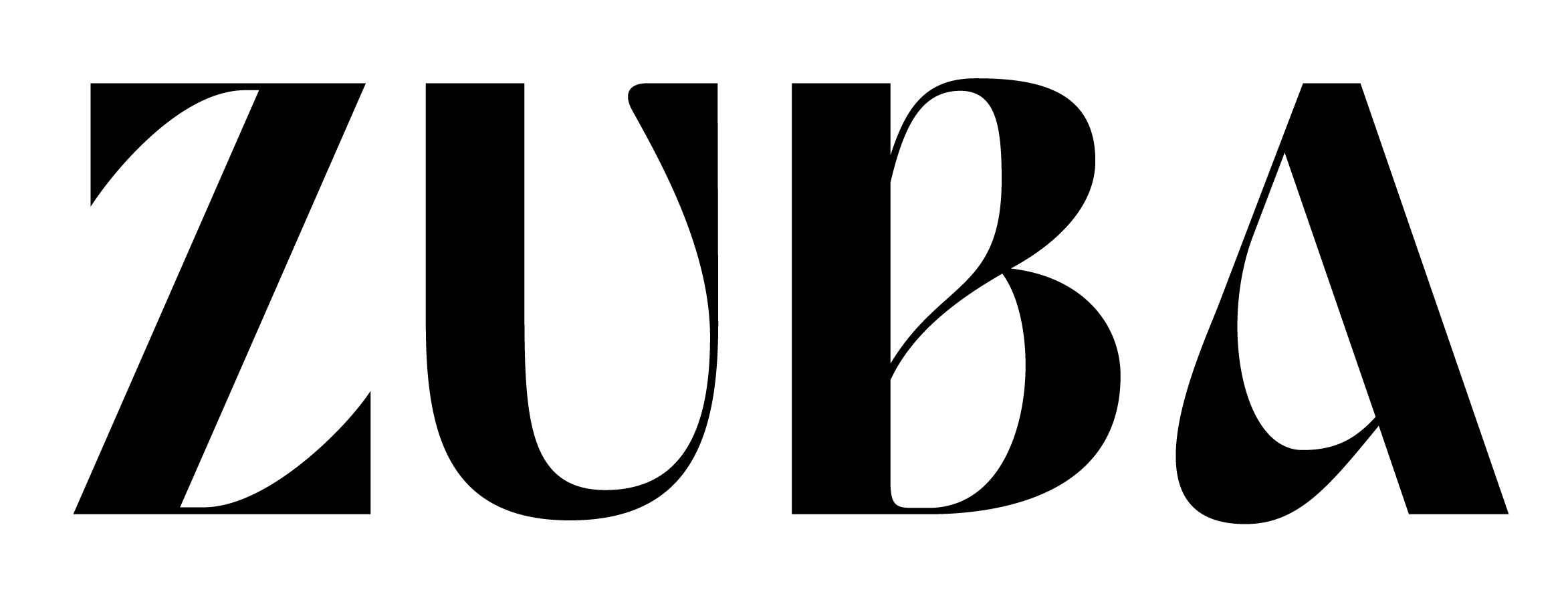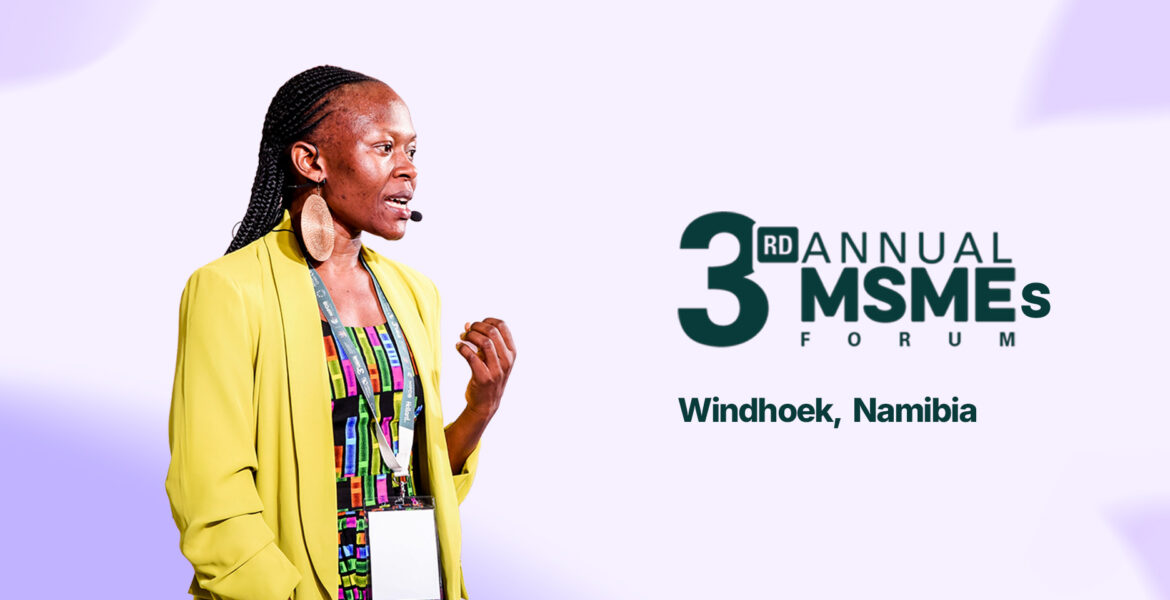The excitement was palpable on Wednesday, September 11, as the winners of the inaugural Enterprise African Network’s Chelete Cage Pitching competition were announced during a gala dinner held on the sidelines of the 3rd Annual MSMEs Forum at the prestigious Droombos in Windhoek, Namibia.
Janet Kabugho from Uganda and Rosalia Neshuku from Namibia emerged among the top three, solidifying women’s growing role in driving entrepreneurship on the continent. Kabugho, founder of Skills Centrum Rwenzori, which empowers women artisans with market and skills training, emerged as the second runner-up, while Rosalia, founder of Namutse Creative from Namibia, claimed third place. However, it was Vitalis P. Haupindi of Yyeniai, an education AI startup from Namibia, who emerged as the competition’s overall winner.
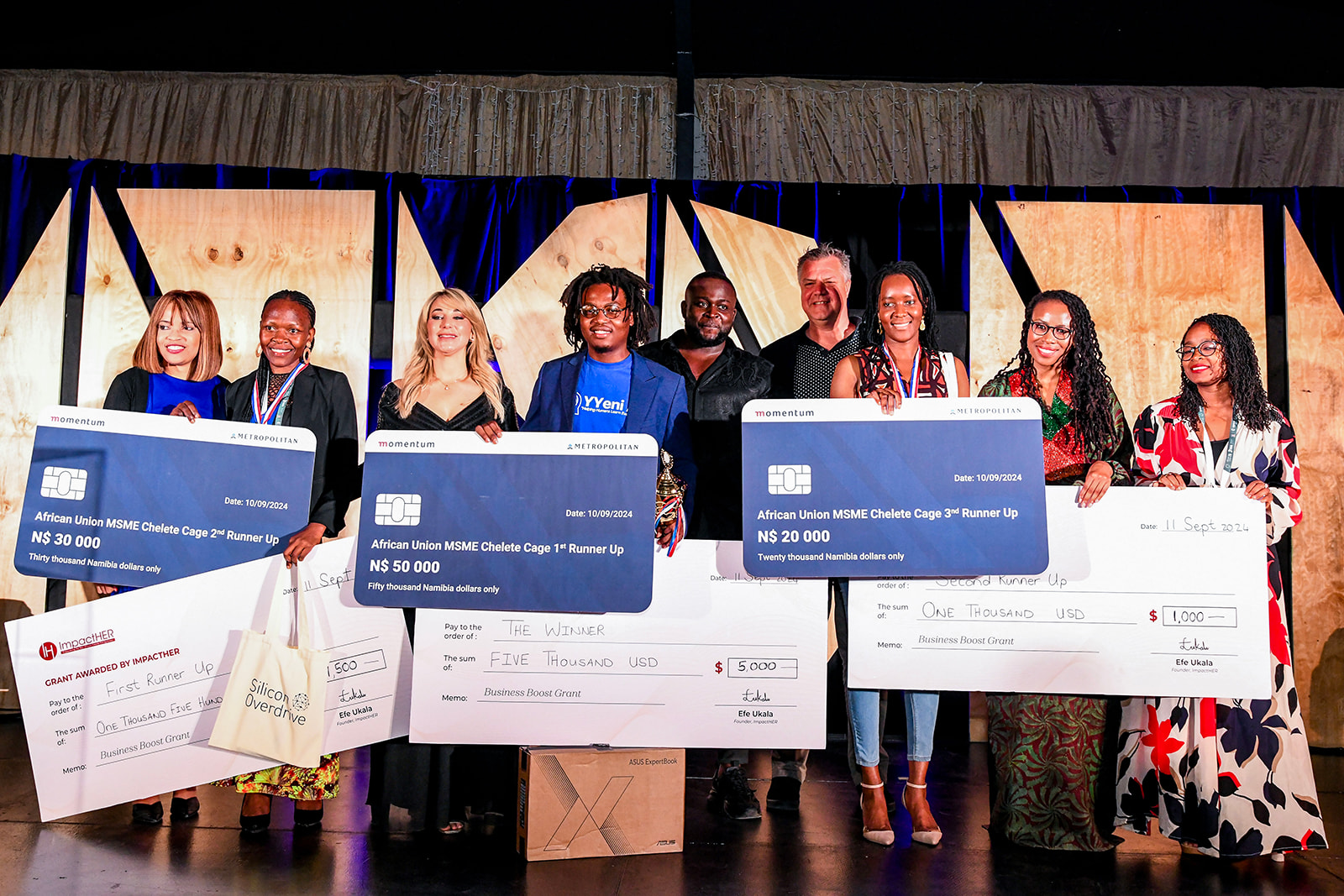
The three were among the top 10 finalists who took to the stage on Tuesday evening to pitch their ideas to an esteemed panel of judges. It was a powerful showcase of creativity and innovation, with the entrepreneurs vying for funding to take their startups to the next level.
Vitalis walked away with USD 5,000 from ImpactHer, N$50,000 from Momentum Namibia, USD 100,000 in credits from Amazon Web Services (AWS), a laptop, one-on-one mentorship from the International Trade Center, and a fully funded trip to the 2025 International African Trade Fair.
As second prize winner, Kabugho bagged USD 1,500 from ImpactHer, N$30,000 from Momentum Namibia, USD 100,000 in AWS credits, a laptop, one-on-one mentorship from the International Trade Center, and a fully funded trip to the 2025 International African Trade Fair and Rosalia won USD 1,000 from ImpactHer, N$20,000 from Momentum Namibia, USD 100,000 in AWS credits, a laptop, one-on-one mentorship from the International Trade Center, and a fully funded trip to the 2025 International African Trade Fair.
Speaking to Zuba Network shortly after the event, an ecstatic Kabugho revealed that the funding comes at a critical time as she works to scale her enterprise in preparation to partake in trading under the Africa Continental Free Trade Area (AfCFTA).
“We already have a ready demand for these products. So, I’m going to use this funding to train the women and increase production so we can meet the current demand that we have,” she said.
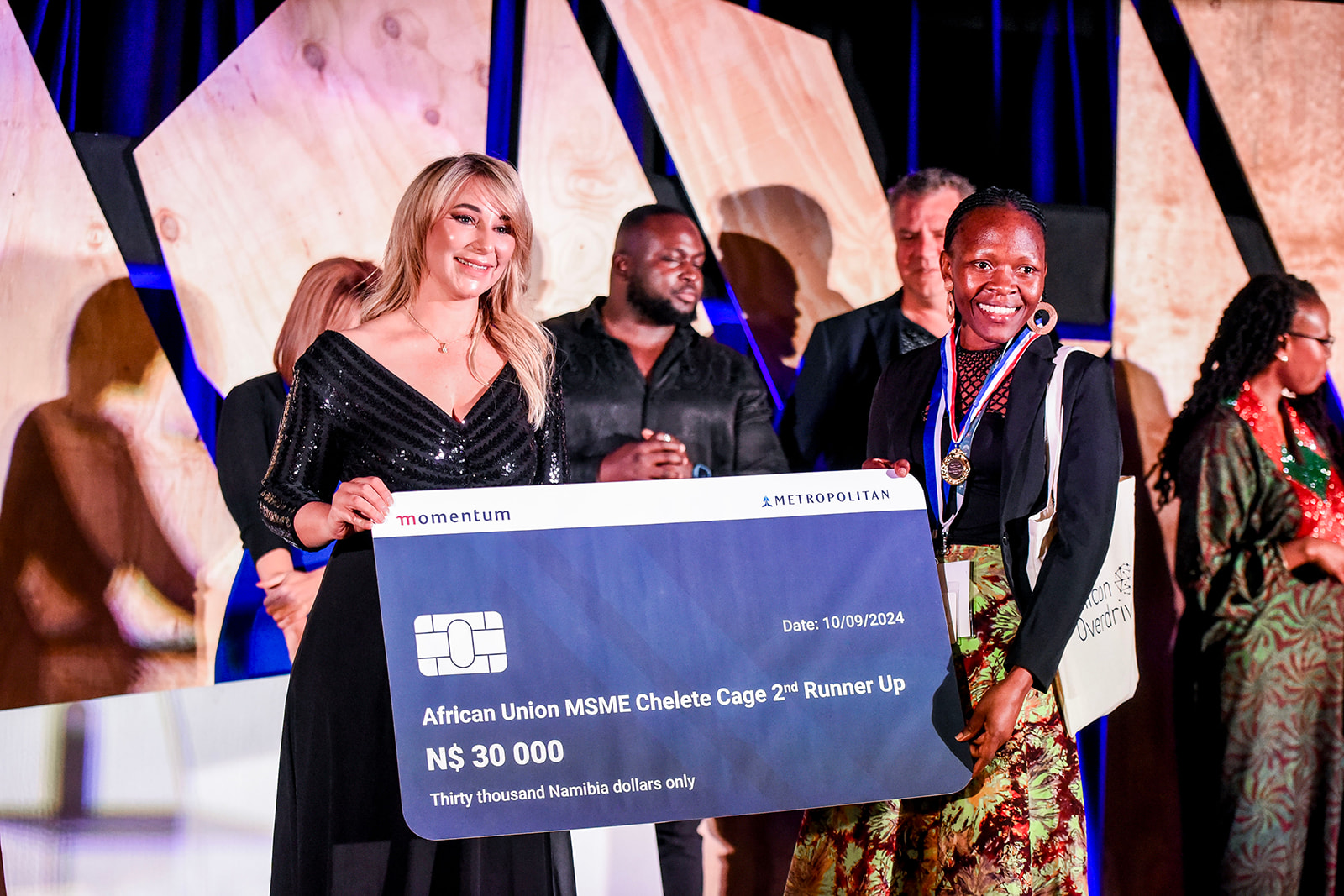
Kabugho is one of 50 fellows selected for the inaugural EAN Fellowship, a program that aims to support African micro, small, and medium-sized enterprises (MSMEs) through mentorship, access to markets, and financing. The fellows were flown to Namibia not only to participate in the pitch competition but also to network, learn, and exhibit their products during the MSMEs Forum.
“I have done a lot of networking here. We have connected with pioneers who are creating impactful change. We believe collaborating and working together will enable us to grow. We’re also being exposed to market opportunities we didn’t know about,” Kabugho added.
Speaking during the gala, Dr. Ron Osman Omar, Acting Head of Industry, Innovation, and Minerals Division at the African Union revealed that the Enterprise Africa Network was born out of the need to develop African MSMEs through the Africa SME Strategy, which was adopted by the ministers of trade, industry, and minerals in 2019.
Small and medium-sized enterprises are the backbone of Africa’s economy. According to the World Economic Forum, SMEs contribute approximately 90% of businesses and generate 50% of jobs across the continent. In Sub-Saharan Africa alone, SMEs make up about 95% of all registered businesses and contribute roughly 50% to GDP.
Recognizing their importance, Dr. Ron said that the African Union Commission developed the AU Small and Medium Enterprise Strategy, which was adopted by the Executive Council in 2019 and endorsed by the Heads of State and Government in 2022.
“While we were developing the SME strategy, we all agreed that what was most important for the SMEs was access to technology, markets, and finance. And then we said that we need to have a program to address these three. So, we developed what we call the Enterprise Africa Network.”
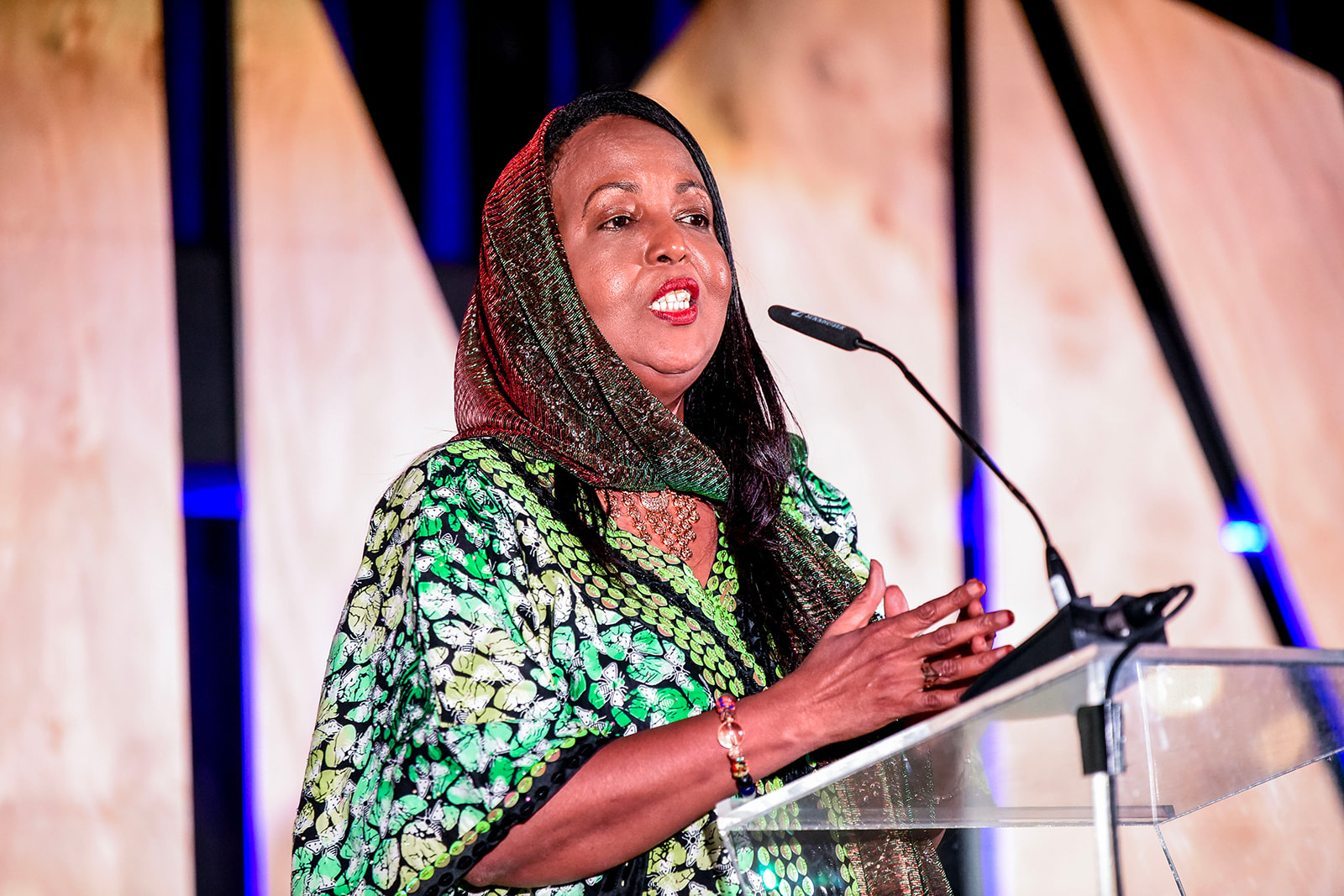
For the inaugural fellowship, 50 businesses from across different regions of the continent were selected to take part in the 12-month program, with a focus on sectors like sustainable agriculture, manufacturing, digital transformation, mineral resource value addition, and the creative industries. The EAN serves as a vital support network, connecting African micro, small, and medium enterprises (MSMEs) with markets, skills, and funding.
It operates under three main pillars: the African Trade Observatory (ATO), the Trade Routes Platform (TRP), and the Market Intelligence Information System (MIIS). Additionally, it includes the Investment Financing Network (IFN), which facilitates business start-ups and MSMEs in priority sectors by mobilizing funds and building connections with investment networks.
“Beyond the forum, we expect a lot of learning through our mentors and the Enterprise Africa Network program. The fellowship has been really enriching in terms of opening doors for us,” said Kabugho.
Africa’s entrepreneurial future is bright, and with initiatives like EAN, the continent’s MSMEs will have the tools and support they need to overcome challenges, grow their businesses, and make a lasting impact on their communities and beyond.
“We are very grateful for the opportunity to support these entrepreneurs. This is not the end, it is just the beginning.” Dr Ron remarked during the conclusion of the gala.
This article was produced as part of a series of our coverage of the 3rd Annual MSMEs Forum, in Windhoek, Namibia, courtesy of the African Union Media Fellowship.

